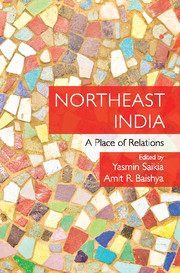Book contents
- Frontmatter
- Contents
- List of Figures
- List of Boxes
- List of Tables
- Acknowledgments
- Introduction
- Section I Contemporary Politics and Issues of Definition
- 1 Solidarity, Visibility and Vulnerability: ‘Northeast’ as a Racial Category in India
- 2 India and its Northeast: Another Big Push without a Take-Off?
- 3 (Un)natural Disasters and the Role of the State in the Brahmaputra Valley, Assam
- Section II Creating Presence
- Section III Knowing through Experience
- Section IV Rethinking Politics
- Glossary
- About the Contributors
- Index
1 - Solidarity, Visibility and Vulnerability: ‘Northeast’ as a Racial Category in India
from Section I - Contemporary Politics and Issues of Definition
Published online by Cambridge University Press: 23 July 2017
- Frontmatter
- Contents
- List of Figures
- List of Boxes
- List of Tables
- Acknowledgments
- Introduction
- Section I Contemporary Politics and Issues of Definition
- 1 Solidarity, Visibility and Vulnerability: ‘Northeast’ as a Racial Category in India
- 2 India and its Northeast: Another Big Push without a Take-Off?
- 3 (Un)natural Disasters and the Role of the State in the Brahmaputra Valley, Assam
- Section II Creating Presence
- Section III Knowing through Experience
- Section IV Rethinking Politics
- Glossary
- About the Contributors
- Index
Summary
Introduction
The ‘Northeast’ is a category constructed by the Indian state for the purposes of controlling, governing and applying extraordinary legal provisions to its rebellious eastern frontier. It homogenizes and depoliticizes the peoples and territories claimed by the Indian state and subjects them to a perpetual process of state-making characterized by violence and (mal)development. Yet the peoples subject to the category – both the idea and the institutions that are enabled by it – use it. They speak it, respond to it and identify with it. In part, this is acquiescence to the national and local state that shapes everyday life for people in the region; layers of public and private institutions that use the category to describe everything from small business finance initiatives to trade fairs. The category is also used throughout India by the media, in committees formed to address ‘Northeast issues’, and ‘on the streets’, as it were, to refer to people from the region and to misidentify others assumed to be from the region (and vice-versa). Thus being a ‘North-easterner’ or ‘from the Northeast’ ascribes a set of attributes to groups and individuals, whether they like it or not. On the other hand, the category Northeast can also be an affirmation of solidarity by people from the region. Not by all people, and not all the time, but certainly the category is used enough by those subject to it to warrant some consideration of its value for those seeking to claim it as a positive affirmation of who they are and where they fit, or don't, in the national picture.
In this chapter I argue that by identifying as a distinct racial community, migrants from the Northeast build relationships and solidarities across ethnic and class lines that are far more difficult (and granted, less necessary) back home; though during moments of crisis and pitched battles along racial lines, solidarity can be seen back home too. At the same time, the articulation of a common identity exposes Northeast communities to heightened levels of visibility and vulnerability, especially to retaliatory violence. The category affirms Indian claims to the region, ‘India's north-east’, but can also shape shared identities ‘from below’, especially in response to racism.
- Type
- Chapter
- Information
- Northeast IndiaA Place of Relations, pp. 27 - 44Publisher: Cambridge University PressPrint publication year: 2017
- 3
- Cited by



